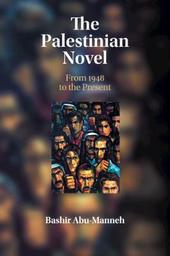
|
The Palestinian Novel: From 1948 to the Present
Paperback / softback
Main Details
| Title |
The Palestinian Novel: From 1948 to the Present
|
| Authors and Contributors |
By (author) Bashir Abu-Manneh
|
| Physical Properties |
| Format:Paperback / softback | | Pages:245 | | Dimensions(mm): Height 230,Width 153 |
|
| Category/Genre | Literary studies - from c 1900 -
Literary studies - fiction, novelists and prose writers |
|---|
| ISBN/Barcode |
9781316501863
|
| Classifications | Dewey:892.736 |
|---|
| Audience | | Professional & Vocational | |
|---|
|
Publishing Details |
| Publisher |
Cambridge University Press
|
| Imprint |
Cambridge University Press
|
| Publication Date |
20 December 2018 |
| Publication Country |
United Kingdom
|
Description
What happens to the Palestinian novel after the national dispossession of the nakba, and how do Palestinian novelists respond to this massive crisis? This is the first study in English to chart the development of the Palestinian novel in exile and under occupation from 1948 onwards. By reading the novel in the context of the ebb and flow of Arab and Palestinian revolution, Bashir Abu-Manneh defines the links between aesthetics and politics. Combining historical analysis with textual readings of key novels by Jabra, Kanafani, Habiby, and Khalifeh, the chronicle of the Palestinian novel unfolds as one that articulates humanism, self-sacrifice as collective redemption, mutuality, and self-realization. Political challenge, hope, and possibility are followed by the decay of collective and individual agency. Genet's and Khoury's unrivalled literary homages to Palestinian revolt are also examined. By critically engaging with Lukacs, Adorno, and postcolonial theory, questions of struggle and self-determination take centre stage.
Author Biography
Bashir Abu-Manneh is Lecturer in Postcolonial Literature and Director of the Centre for Colonial and Postcolonial Studies at the University of Kent. He is the author of Fiction of the New Statesman, 1913-1939 (2011).
Reviews'... an original and ambitious contribution to the study of Palestinian literature. His is the first study to offer a truly formalist account - and critique - of Palestinian novels. And when so many scholars have retreated from criticism - from contentious claim-making in general - it is refreshing to see someone engaging in learned debate. Abu-Manneh reminds us that there are things at stake in the Palestinian novel, in its history, and in its reception.' Elliott Colla, Journal of Palestine Studies 'Bashir Abu-Manneh's The Palestinian Novel is a fascinating study that follows the trajectory of the Palestinian novel from the nakba (the Arabic term meaning 'Catastrophe' that refers to the 1948 expulsion of Palestinians from their homeland) all the way through to the Oslo Accords, a set of agreements in the 1990s between the government of Israel and the Palestine Liberation Organization (PLO) ... this book is a brave and fascinating endeavour to engage with the Palestinian novel through a materialist framework while giving equal weight to history and aesthetic form.' Eleni Philippou, Oxford Comparative Criticism and Translation '... The Palestinian Novel deserves to be read for its sensitive literary engagement and its thoughtful readings of key texts.' Nadia G. Yaqub, International Journal of Middle East Studies 'The Palestinian Novel is an immensely knowledgeable, cogent and thought-provoking book, and it should be of interest not only to readers of Palestinian literature, but to anyone with an interest in the relationship between revolutionary and post-revolutionary aesthetics.' Anna Bernard, Wasafiri 'The Palestinian Novel is an important and timely book, introducing a tradition of very fine novels that may be unfamiliar to many readers. The Palestinian Novel is also, in some respects, a controversial book. It engages in those current intellectual debates as to the political and epistemological limits and possibilities of committed art.' Pam Morris, Catalyst 'Bashir Abu-Manneh's exceptionally shrewd and knowledgeable study of the Palestinian novel from the Nakbah of 1948 to the Palestinians' current regrettable state of political fragmentation is guided by this conviction that the narrative content and especially the form of the novel provide an unusually lucid articulation of the, to put it mildly, fluctuating fortunes of the Palestinian revolution.' Robert Spencer, New Formations '... the most comprehensive analysis to date of most of the selected writers ...' Sally Bland, The Jordan Times '... the work takes a bold stride in what might be a new direction in Palestinian literary study - to look beyond the nation at what Palestinian literature means for the world, and not just the homeland.' Nora Parr, Arab Studies Journal
|